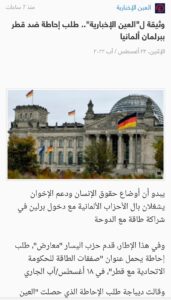Diplomatic sources revealed to Emirates Leaks that the UAE plots to launch a campaign of incitement against the State of Qatar in the German Parliament (Bundestag) following Berlin’s entry into an energy partnership agreement with Doha.
The sources said that Emirati media, led by the Al-Ain news website, published an alleged memorandum document regarding a briefing request submitted by the opposition Left Party in the German Parliament.
The sources pointed out that the alleged memo was not seen by anyone and was not originally presented in the German parliament. The Emirati website deleted it shortly after its publication due to its lack of credibility.
According to the sources, the Emirati embassy in Berlin coordinated the alleged memorandum with three members of the German parliament, Sevim Dagdelin, Andrei Honko, Shklin Nastich and the D-Link parliamentary group.
Andrei Honko, with Emirati-Israeli support, led efforts to stop a Turkish program related to the manufacture of Turkish drones, while Sevim Dagdelin is of Turkish origin and is constantly attacking Turkey.
The alleged memo stated a direct incitement to the human rights situation in Qatar and the allegation of the death of at least 15,000 foreigners in the country during the past ten years after it won the right to host the 2022 World Cup.

Qatar and Germany signed a partnership agreement in May in the field of energy amid Berlin’s efforts to search for alternatives to Russian gas, which provides 45 per cent of Berlin’s needs.
The German Ministry of Economy said that “the Emir of Qatar, Sheikh Tamim bin Hamad Al Thani, signed the agreement with German Economy Minister Robert Habeck” in Berlin.
According to the statement, “The energy partnership will help Germany diversify its gas supplies by importing liquefied natural gas from Qatar, and at the same time will give momentum to cooperation in the field of green hydrogen.”
The German ministry statement indicated that regular meetings would be held between the Qatari Ministry of Energy and the German Federal Ministry for Economics and Climate Protection.
The statement said that the two countries agreed to form two working groups, one of which is concerned with strengthening trade relations in the field of liquefied natural gas and hydrogen and establishing a forum on infrastructure and regulatory issues.
The other working group is on renewable energy, energy efficiency and load management and will work on developing renewable energy capabilities and related issues such as infrastructure and electricity markets.



